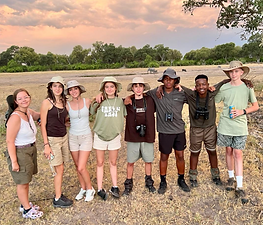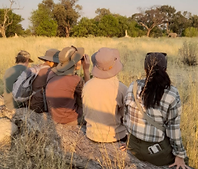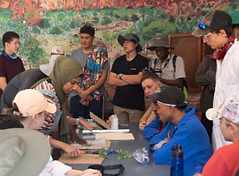Outdoor Education Program
Philosophy
The Philosophy of outdoor education can be traced back to many moments in history; one worth highlighting is the Enlightenment and Rousseau’s Natural approach to teaching and learning. The central tenet is that “although it is not natural for humans to remain children, it is also not natural for humans to resist Nature. But as the child matures into adulthood, social conditions deceive humans into thinking control is in the hands of humanity” (Peckover, 84). Our program addresses this issue directly. We strive to (re)awaken the love of nature in students, and as Rousseau would conceptualize it, facilitate their self-actualization towards their own Nature in the context of knowing and thus respecting the natural world.
We also recognize the post-structuralist point of view of learning from and with different cultures. Our program desires to provide social and economic platforms for empowering people of all backgrounds, and build community both locally and globally in the wild and rich environment that is Southern Africa.


The Why
Academic research for decades has shown correlations between adolescent development and outdoor education. Students demonstrate higher rates of agency, self-confidence, critical thinking, and team-work after experiencing nature in a strategically implemented fashion where these cognitive and meta-cognitive skills are facilitated to grow. Notably, these skills learned outdoors translate into improved academic outcomes for the majority of students (Broda, 2002).
From a contemporary pedagogical perspective, schools since the 1970’s have implemented outdoor programs with varying goals of (re)engaging students in and with nature including team-building, social/emotional development, service learning, and camping skills.
Our program takes these goals a step further. We make the outdoors academically oriented on all our trips by doing experiential lessons that students can relate back to the classroom. Moreover, on specific trips students participate in real academic research with PhDs collecting field data. And our final and most important piece is that we take great care with our students to instill personal and social responsibility for nature.
Our Approach
Beginning in the Primary Years Program, students already have the opportunity to experience one and two night trips close to Windhoek. These short trips are designed to acclimate students to the African bush and teach them the basic skills of camping. In the Middle Years Program our trips become much more physically demanding like canoeing down the Orange River. In addition, students also attend trips in the Namib Desert focusing on academic field research in ecology, conservation, and sustainability. With our high school trips, students engage in more community work with local villages, service learning, and further professional opportunities including safari guiding certification.
Our approach to outdoor education reflects a progression for students to challenge themselves at increasingly more demanding levels of rigor. Whether it is physical, social, intellectual, or emotional, we are constantly requiring students to exert themselves outside of their comfort zones, thus developing their agency, confidence, teamwork, and love of the outdoors.
The WIS Outdoor Education Center
Windhoek International School understands the importance of opening up . opportunities to the larger educational community. Namibia and Southern Africa are unique in their retention of the natural world, and it is something that every young person should experience. As such, we would like to extend this program to schools from around the world to participate. Through our program coordinator, Forrest Donoho, we can arrange trips for schools depending on the desires and requirements for student learning.



